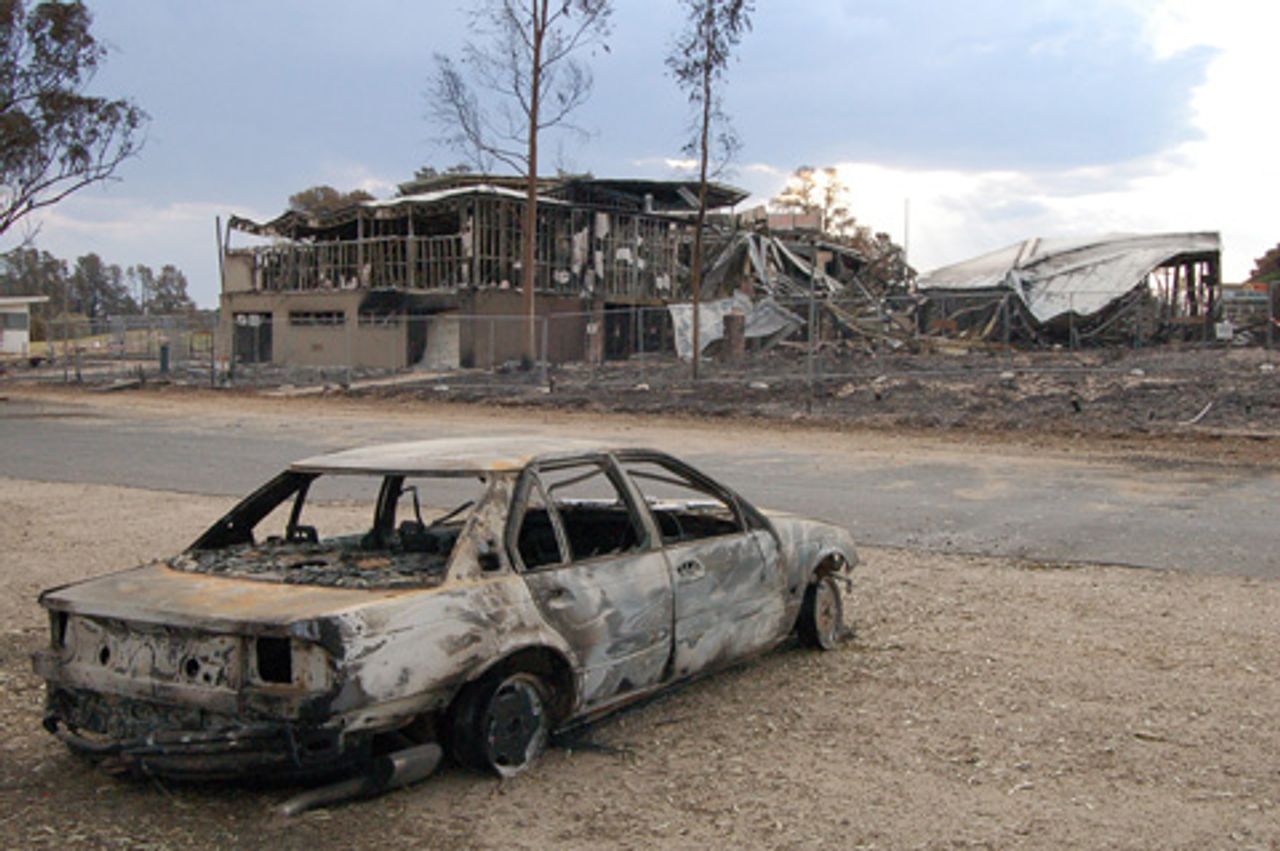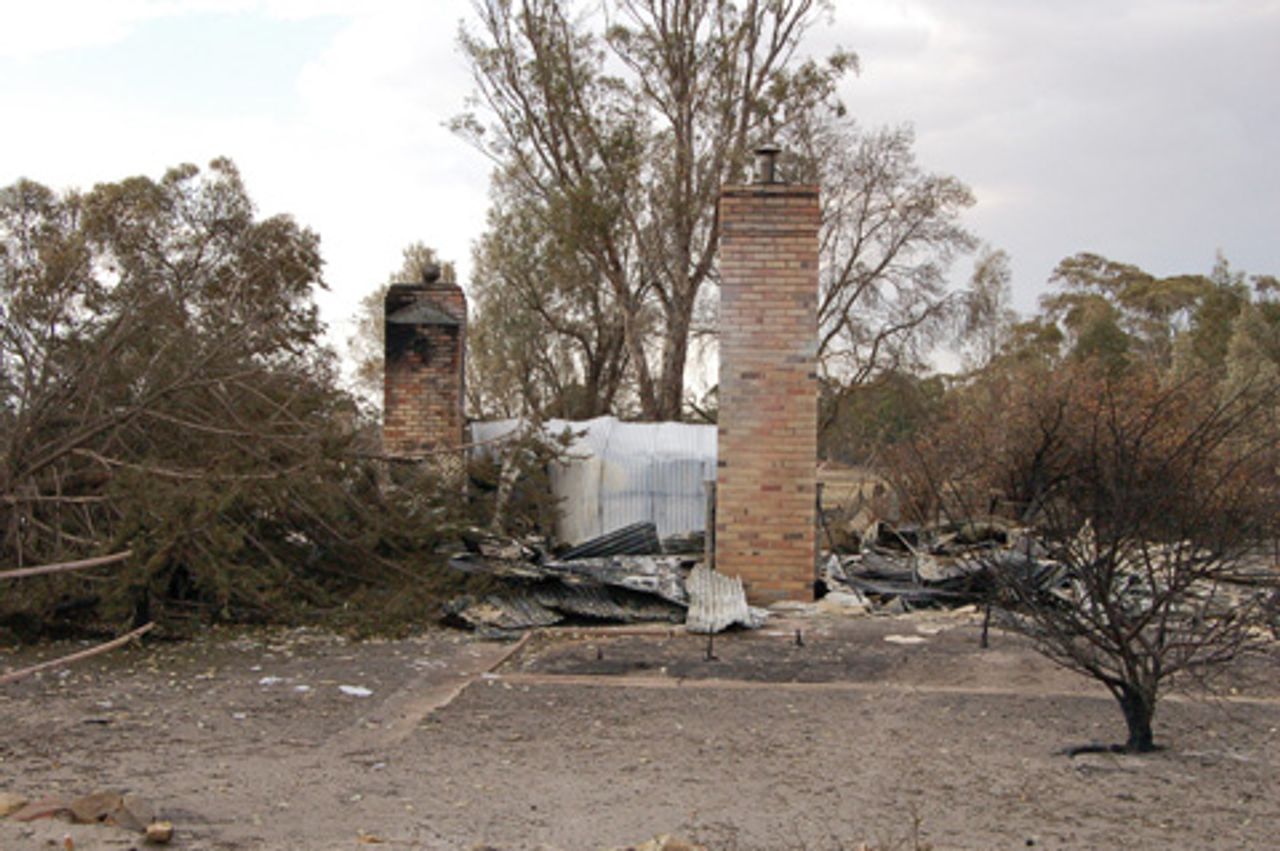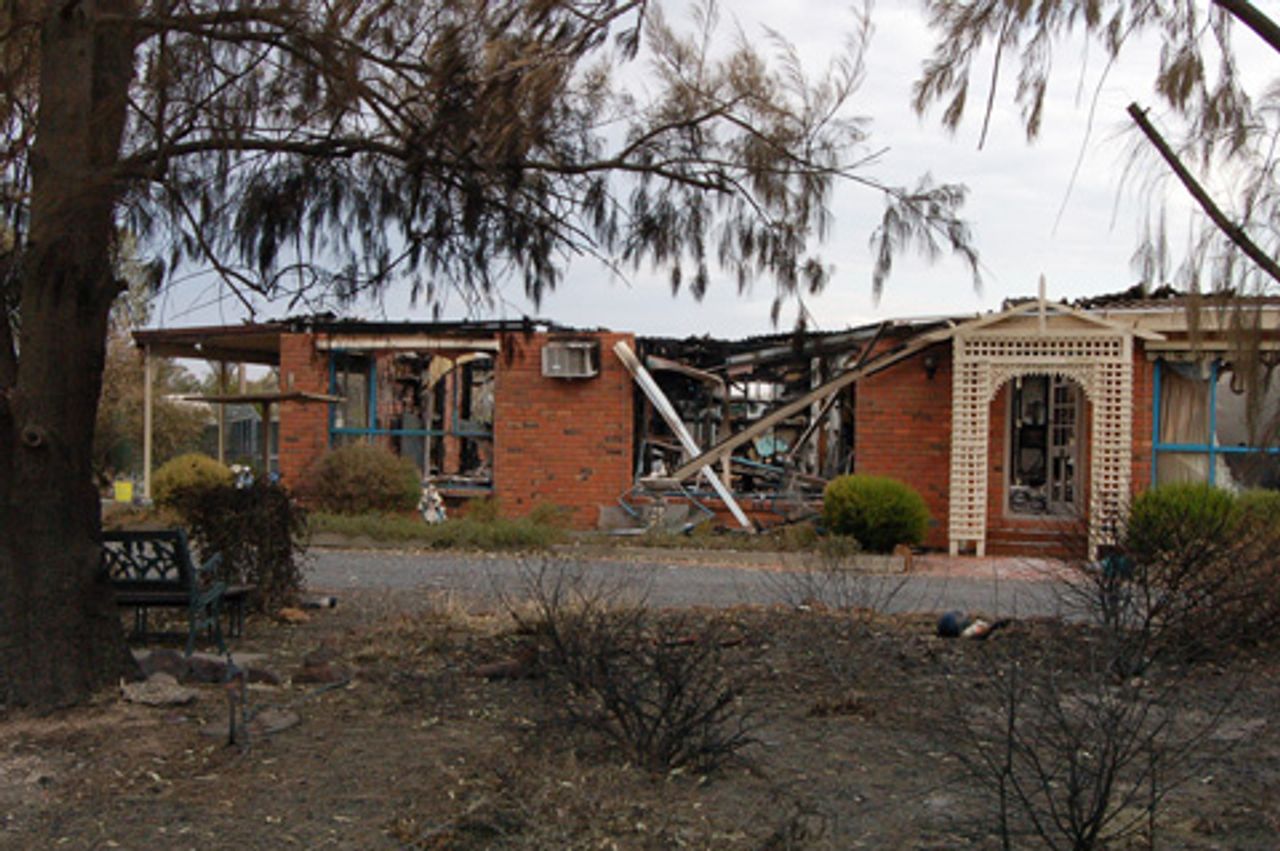The WSWS received this report from a supporter in Horsham, a regional town in western Victoria, about the fire that seriously threatened the community on Black Saturday, February 7. Although no one died in Horsham, unlike other areas of the state, where more than 200 people have now been confirmed dead, the report indicates that lives could well have been lost in Horsham too if a wind change had not turned the blaze away from the town.
The fire at Horsham (population 12,000) in western Victoria was started by a power pole failure 2 kilometres west of the town. Driven by extremely hot and dry 80 kph northerly winds, the fire gutted a golf course, right on the edge of town, and threatened many houses.
Before a late wind change, the blaze came within 300-400 metres of residential areas. By the time the fire was contained, 10 houses and 2,300 hectares were destroyed, many livestock, mainly sheep, were lost and 60 hay and machinery sheds and a freight depot burned down.
 Horsham Golf Club
Horsham Golf ClubUntil the last moment, however, members of the public were unaware that a disaster was potentially waiting to happen. Horsham residents only had knowledge of the fire through the ABC radio coverage on the fire situation across Victoria. Occasional snippets of news were given regarding the Horsham fire, mainly concerning road closures.
Although the high-risk factors of extreme heat and dry conditions were recognised well before the disaster, little was done to either prepare the communities for eventualities or have a plan in place. Had the wind turned earlier, the outcome may well have reached the proportions of the Marysville fire, in which 39 people are confirmed to have died.
A senior controller from the Horsham fire-fighting crew told me that had the fire turned toward the town any earlier, it would have been difficult, at the very least, to save Horsham West for a distance of 4 to 10 blocks into the town itself. He said the ability of fire-fighters to control such a severe fire with the units and personnel on hand would have been in doubt.
The controller said that alerting residents was a major problem. If he had any criticism, he said, it would be with the lack of communication. "Due to the speed of the fire, things got missed, lost."
In one incident reported by the media, Mollie Cutchie, an 82-year-old war widow living on a five hectare property on the south-west side of Horsham, was rescued from her home just before it was engulfed in flames. Her daughter, Mandy Woolman, called a taxi for the disabled to save her wheelchair-bound mother when she saw flames streaking toward the house.
 Remains of Mollie Cutchie’s home
Remains of Mollie Cutchie’s homeThe taxi driver had to risk his own life to get to the panic-stricken pair. By the time that they escaped, the back fence and driveway of the cottage were alight. A few minutes later, the house burnt down.
As in other regions across the state, the fire-fighting effort depended almost entirely on volunteers. The local volunteer Country Fire Authority (CFA) was supported by volunteer fire crews from many rural stations, a small professional Department of Sustainability and Environment (DSE) crew with inadequate equipment, and home owners and friends who worked during the day, at great personal risk.
Some CFA volunteers were nearly killed. Two fire fighters from Dimboola, a nearby regional town, escaped narrowly when fire passed over their brigade 4WD as they crouched on the floor. They reversed to safety with mudflaps and tyres smouldering. Two of the Horsham crew were burnt and their truck had to be taken out of action while damage was mended. The fire had taken around 10 seconds to travel around 200 metres, catching them while they were taking defensive action.
The intensity of the fire proved too much for the equipment supplied to the CFA volunteers. Jamie Chandler, the CFA captain from Wonwondah, said that the perspex of his safety goggles just melted out. "There were no sprayers to protect the tyres. Our windscreen wipers caught on fire. We were having trouble breathing. I have never been choked for breath before at a fire and I've never felt that much heat. It felt like my skin was burning. The heat was incredible. There is a fair bit of heat damage to the trucks and appliances, and to the fire-fighters".
 Burnt out Horsham home
Burnt out Horsham homeMichael, a CFA fighter, received burns to his face and needed medical attention. He told me he had trained since 1995 to fight fires, and had fought two alpine fires, but believed that this fire was far worse than any other, given its unprecedented speed and ferocity.
Since the dangers were known in advance by the CFA's fire indices, there was a higher state of alert than usual. "We knew we needed major help, so we called in our second unit," Michael said. But the resources were soon impossibly stretched. The DSE only had a couple of smaller units, and a helicopter with a "belly tank" that had been grounded due to the wind.
The local newspaper, the Wimmera Mail Times, ran extensive photographic essays on the fire, but scarcely made any reference to the source of the blaze—a failure of the power infrastructure. As if to deflect attention away from the main story, the source of the blaze, the paper ran an article on looters and questioned people on their attitudes to arsonists. But I spoke to current and former Powercor employees, who said there had been problems with the maintenance of the power infrastructure.
A number of political questions are raised. Privatisation of former public bodies, by Labor and Liberal governments alike, has led to years of neglect and great reductions in services, maintenance and support for communities. The power provider Powercor has disregarded the need for safe and accessible power infrastructure.
No other support mechanisms were in place to handle such an event. The DSE has had its government resourcing reduced, leading to a lack of fuel reduction work over the years and only lip-service has been paid to resourcing for fire fighting. This fire underlines the need to oppose the free-market policies that have had such a damaging impact on community safety, through the underfunding of basic services and the lack of commitment to proper resourcing.
